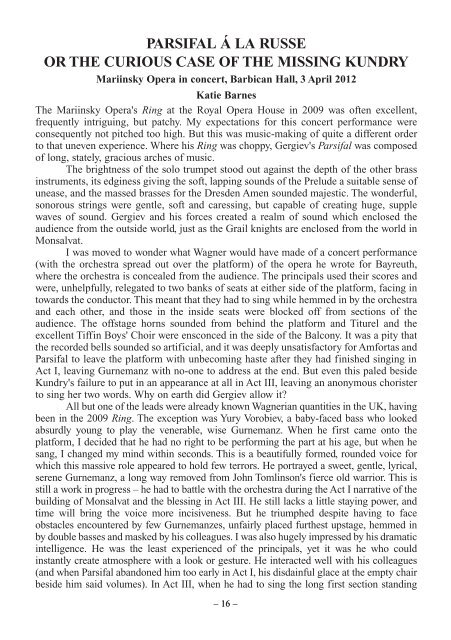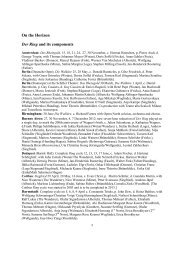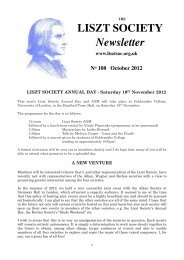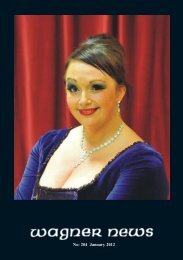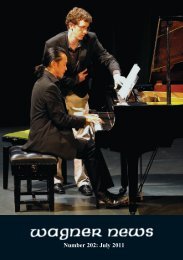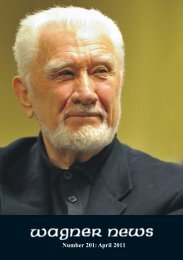13895 Wagner News 174 - Wagner Society of England
13895 Wagner News 174 - Wagner Society of England
13895 Wagner News 174 - Wagner Society of England
Create successful ePaper yourself
Turn your PDF publications into a flip-book with our unique Google optimized e-Paper software.
PARSIFAL Á LA RUSSE<br />
OR THE CURIOUS CASE OF THE MISSING KUNDRY<br />
Mariinsky Opera in concert, Barbican Hall, 3 April 2012<br />
Katie Barnes<br />
The Mariinsky Opera's Ring at the Royal Opera House in 2009 was <strong>of</strong>ten excellent,<br />
frequently intriguing, but patchy. My expectations for this concert performance were<br />
consequently not pitched too high. But this was music-making <strong>of</strong> quite a different order<br />
to that uneven experience. Where his Ring was choppy, Gergiev's Parsifal was composed<br />
<strong>of</strong> long, stately, gracious arches <strong>of</strong> music.<br />
The brightness <strong>of</strong> the solo trumpet stood out against the depth <strong>of</strong> the other brass<br />
instruments, its edginess giving the s<strong>of</strong>t, lapping sounds <strong>of</strong> the Prelude a suitable sense <strong>of</strong><br />
unease, and the massed brasses for the Dresden Amen sounded majestic. The wonderful,<br />
sonorous strings were gentle, s<strong>of</strong>t and caressing, but capable <strong>of</strong> creating huge, supple<br />
waves <strong>of</strong> sound. Gergiev and his forces created a realm <strong>of</strong> sound which enclosed the<br />
audience from the outside world, just as the Grail knights are enclosed from the world in<br />
Monsalvat.<br />
I was moved to wonder what <strong>Wagner</strong> would have made <strong>of</strong> a concert performance<br />
(with the orchestra spread out over the platform) <strong>of</strong> the opera he wrote for Bayreuth,<br />
where the orchestra is concealed from the audience. The principals used their scores and<br />
were, unhelpfully, relegated to two banks <strong>of</strong> seats at either side <strong>of</strong> the platform, facing in<br />
towards the conductor. This meant that they had to sing while hemmed in by the orchestra<br />
and each other, and those in the inside seats were blocked <strong>of</strong>f from sections <strong>of</strong> the<br />
audience. The <strong>of</strong>fstage horns sounded from behind the platform and Titurel and the<br />
excellent Tiffin Boys' Choir were ensconced in the side <strong>of</strong> the Balcony. It was a pity that<br />
the recorded bells sounded so artificial, and it was deeply unsatisfactory for Amfortas and<br />
Parsifal to leave the platform with unbecoming haste after they had finished singing in<br />
Act I, leaving Gurnemanz with no-one to address at the end. But even this paled beside<br />
Kundry's failure to put in an appearance at all in Act III, leaving an anonymous chorister<br />
to sing her two words. Why on earth did Gergiev allow it?<br />
All but one <strong>of</strong> the leads were already known <strong>Wagner</strong>ian quantities in the UK, having<br />
been in the 2009 Ring. The exception was Yury Vorobiev, a baby-faced bass who looked<br />
absurdly young to play the venerable, wise Gurnemanz. When he first came onto the<br />
platform, I decided that he had no right to be performing the part at his age, but when he<br />
sang, I changed my mind within seconds. This is a beautifully formed, rounded voice for<br />
which this massive role appeared to hold few terrors. He portrayed a sweet, gentle, lyrical,<br />
serene Gurnemanz, a long way removed from John Tomlinson's fierce old warrior. This is<br />
still a work in progress – he had to battle with the orchestra during the Act I narrative <strong>of</strong> the<br />
building <strong>of</strong> Monsalvat and the blessing in Act III. He still lacks a little staying power, and<br />
time will bring the voice more incisiveness. But he triumphed despite having to face<br />
obstacles encountered by few Gurnemanzes, unfairly placed furthest upstage, hemmed in<br />
by double basses and masked by his colleagues. I was also hugely impressed by his dramatic<br />
intelligence. He was the least experienced <strong>of</strong> the principals, yet it was he who could<br />
instantly create atmosphere with a look or gesture. He interacted well with his colleagues<br />
(and when Parsifal abandoned him too early in Act I, his disdainful glace at the empty chair<br />
beside him said volumes). In Act III, when he had to sing the long first section standing<br />
– 16 –


